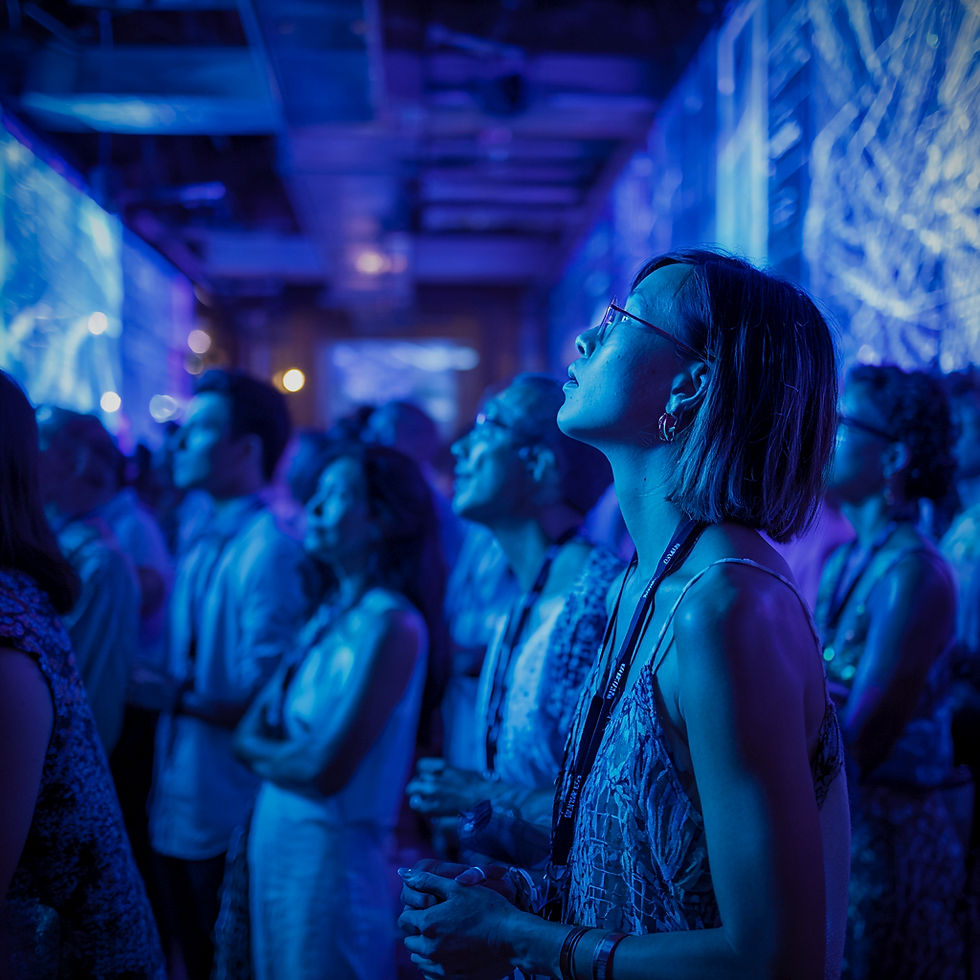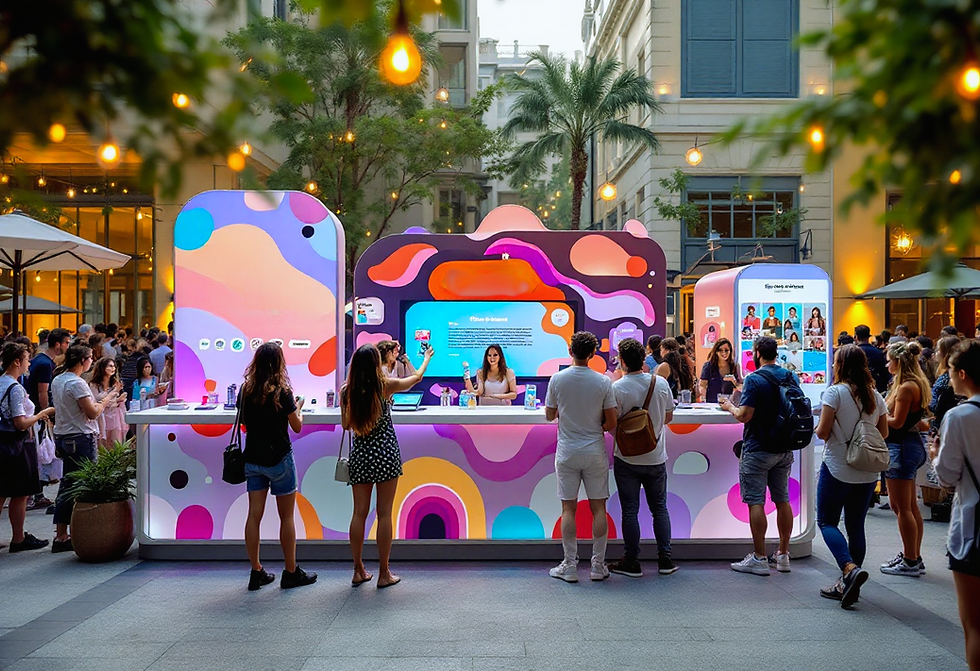Behind the Buzzwords: Storytelling in Events and How to Use It
- Aug 17, 2025
- 6 min read
Updated: Jan 9
Welcome to Part 5 of our "Behind the Buzzwords" series. In this article we're exploring the term "Storytelling" and what it means in the marketing & events world.

"We want this event to tell our brand story."
You've probably made this request at some point. But here's what usually happens next: the conversation stalls. What story, exactly? How do you tell it without creating a corporate presentation disguised as an experience? And how do you measure whether your story actually resonated?
Event storytelling has become another buzzword or phrase that sounds strategic but often lacks substance. The result is events that feel more like brand museums than meaningful experiences, with lots of information, but very little emotional impact.
Let's explore what storytelling actually means in live experiences and how to use it strategically.
What Event Storytelling Really Is
At its foundation, storytelling transforms information into narrative that people care about. It's not about reciting your company history or listing product features, it's about creating context, emotion, and meaning around your brand message.
Effective event storytelling helps your audience:
Understand your brand's purpose beyond what you sell
Connect emotionally to your values and mission
Remember your message long after the event ends
Feel compelled to act on what they've experienced
The key difference: instead of telling people about your new product, you help them understand why it matters to them personally.
The Psychology Behind Live Storytelling
Stories work because they mirror how our brains naturally process and retain information. When we hear facts, we use one part of our brain. When we experience stories, multiple brain regions activate simultaneously. The areas responsible for; language, sensory processing, and emotional response.
In live environments, this effect is amplified because:
Multiple senses engage simultaneously: Unlike reading or watching, live experiences can incorporate sight, sound, touch, smell, and even taste to reinforce your narrative.
Social proof amplifies impact: When people experience stories together, they validate each other's emotional responses, making the impact stronger.
Physical movement enhances memory: Walking through a story creates stronger memory anchors than passive consumption.
Real-time interaction increases investment: When people can influence or participate in your story, they develop ownership of the experience.
The Key Elements of Live Event Storytelling
Successful event storytelling integrates multiple touchpoints to create a cohesive narrative experience:
1. Verbal Storytelling
This includes keynote presentations, panel discussions, host commentary, and even casual conversations between staff and attendees. The key is ensuring all verbal content serves your central narrative.
2. Visual Storytelling
Everything attendees see should reinforce your story: signage, staging design, motion graphics, lighting, color schemes, and spatial layouts. Visual elements often carry more emotional weight than words.
3. Sensory Storytelling
Strategic use of music, ambient sounds, scents, textures, and even temperature can transport people into your brand world and reinforce key story moments.
4. Spatial Storytelling
How people move through your event space tells a story. The journey from arrival to departure should follow a logical narrative arc that supports your key messages.
5. Interactive Storytelling
Technology, hands-on activities, and participation opportunities allow attendees to become part of your story rather than passive observers.
When built right, your story is felt as much as it is heard.
The Strategic Storytelling Framework
To create effective event stories, we use a four-stage framework:
Stage 1: Curiosity (The Hook)
Objective: Capture attention and create intrigue
Tactics: Unexpected elements, compelling questions, sensory surprises, or intriguing visuals that make people want to know more
Stage 2: Connection (The Emotional Bridge)
Objective: Help attendees see themselves in your story
Tactics: Relatable challenges, shared values, personal testimonials, or experiences that mirror your audience's own journey
Stage 3: Clarity (The Revelation)
Objective: Deliver your key message in a meaningful context
Tactics: Clear demonstrations, "aha moments," product reveals, or insights that resolve the tension created in earlier stages
Stage 4: Call to Action (The Next Chapter)
Objective: Inspire specific behavior or mindset changes
Tactics: Clear next steps, exclusive opportunities, community invitations, or tools that help attendees continue the story after your event
What Event Storytelling Is Not
It's not your company timeline. Chronological histories rarely create emotional engagement unless they're framed around overcoming challenges or pursuing meaningful goals.
It's not repetitive messaging. Repeating your tagline or key messages doesn't create narrative, it creates fatigue.
It's not just entertainment. While good stories can be entertaining, entertainment without purpose doesn't drive business results.
It's not a substitute for strategy. Storytelling should support your business objectives, not replace them.
Real-World Applications That Drive Results A Just Honest Case Study:
The Chapter-Based Product Launch A technology company structured their product launch like a storybook, with each room representing a different chapter of their innovation journey. Attendees walked through "chapters" that showed problem identification, solution development and future possibilities. Result: 40% higher message retention compared to traditional product demos.
The Founder's Journey Experience A fashion brand created an immersive experience that followed the founder's creative process, using audio narratives, scent triggers and tactile elements to represent different stages of collection development. Attendees felt personally connected to the brand's creative vision, leading to 60% higher purchase intent.
The Customer Story Walkthrough A B2B software company designed their event around their ideal customer's daily challenges, with each space representing different pain points and how their solution addressed them. The narrative approach helped prospects understand product value in context, resulting in 25% more qualified leads.
All of these provided entertainment, but, it was intentional.
Measuring Storytelling Success
Traditional event metrics don't capture storytelling effectiveness. Focus on these indicators instead:
Message retention: Survey attendees about key story points 24-48 hours after your event
Emotional response: Track sentiment in post-event feedback and social media mentions
Story sharing: Monitor how attendees retell your story to others, both online and offline
Behavioral changes: Measure specific actions taken as a result of your story (sign-ups, purchases, referrals)
Long-term engagement: Track continued interaction with your brand over 30-90 day periods
Common Storytelling Mistakes to Avoid
Making your brand the hero: The most effective stories position your audience as the hero, with your brand as the guide that helps them succeed.
Ignoring the ending: Many events create compelling opening narratives but fail to provide satisfying conclusions or clear next steps.
Overwhelming with subplots: Complex stories with multiple messages often confuse rather than clarify. Focus on one central narrative.
Forgetting the post-event story: Your story shouldn't end when people leave. Plan how to continue the narrative through follow-up communications.
The Business Impact of Strategic Storytelling
When executed effectively, event storytelling delivers measurable business results:
Increased message retention: Stories are up to 22x times more memorable than facts alone
Enhanced emotional connection: Story-driven events create stronger brand loyalty and advocacy
Improved conversion rates: People who connect with your story are more likely to take desired actions
Expanded reach: Compelling stories get shared, extending your event impact beyond attendees
Differentiated positioning: In commodity markets, stories help brands stand out meaningfully
The Future of Event Storytelling
As audiences become more sophisticated and attention spans continue to fragment, storytelling becomes even more crucial.
The events that succeed will be those that create genuine narrative experiences rather than information dumps.
The key is creating experiences that help people see themselves, their challenges and their potential solutions in new ways.
When you master this, your events become more than marketing activities. They become meaningful moments that people carry with them long after they leave.
At Just Honest we specialize in creating narrative-driven experiences that drive genuine engagement and business results. Let's discuss how to bring your story to life in ways that truly resonate.
Follow us for behind-the-scenes magic, event tips, and industry trends:
Disclaimer
The content published on this blog is for informational and inspirational purposes only. While we strive to provide up-to-date insights, expert opinions, and industry trends, the information shared should not be considered as professional advice tailored to any specific event or business need. All views expressed in our blog posts are our own and are intended to inspire creativity, spark innovation, and provide valuable insights into the world of event marketing and management. However, event strategies, technologies, and trends evolve rapidly, and we recommend consulting with a professional before making any major event-related decisions. Additionally, any third-party tools, platforms, or services mentioned in our blog posts are referenced purely for educational purposes. We do not endorse or receive compensation for mentioning them unless explicitly stated.
By using this blog, you acknowledge that we are not responsible for any direct, indirect, or consequential decisions made based on the information provided. We encourage readers to use their discretion, conduct their own research, and reach out for personalized guidance if needed. For expert consultation on event marketing strategies, sustainable event planning, or creating unforgettable brand experiences, feel free to contact us directly.
© Just Honest Events and www.justhonestevents.com 2026. Unauthorized use and/or duplication of this material without express and written permission from this site’s author and/or owner is strictly prohibited. Excerpts and links may be used, provided that full and clear credit is given to Just Honest Events and www.justhonestevents.com with appropriate and specific direction to the original content.



